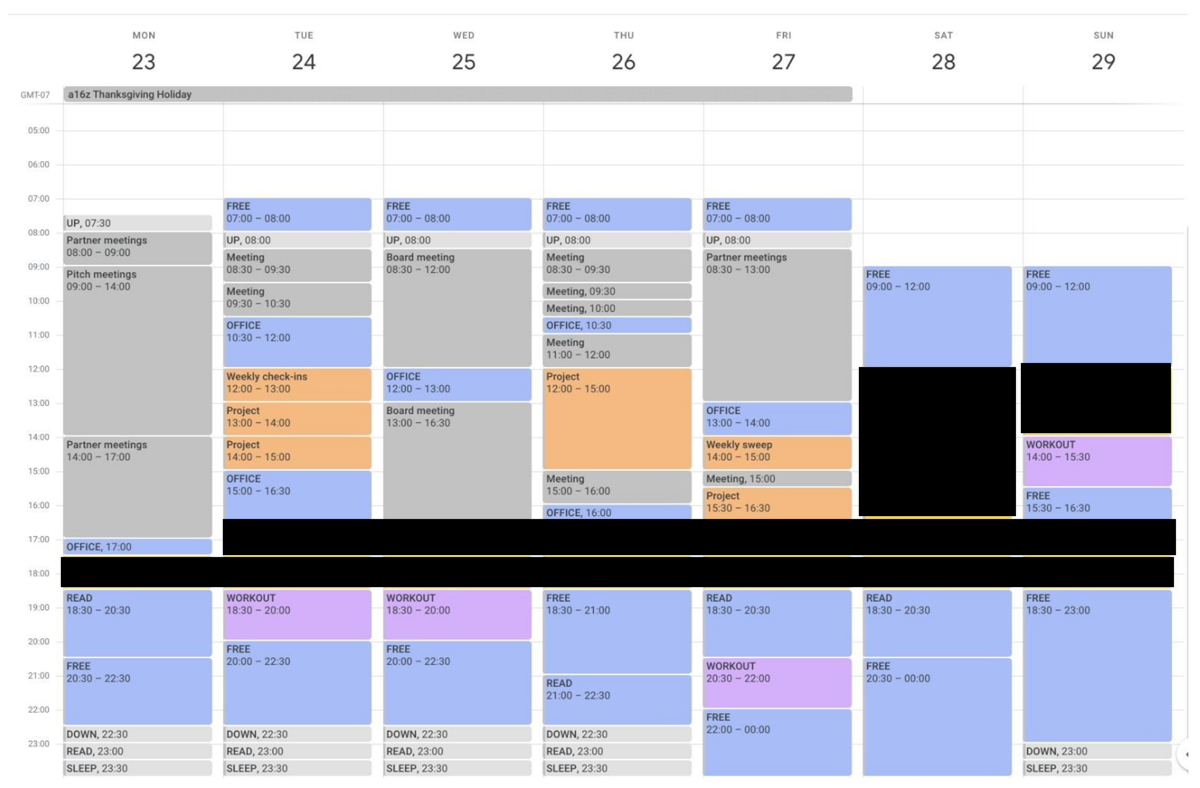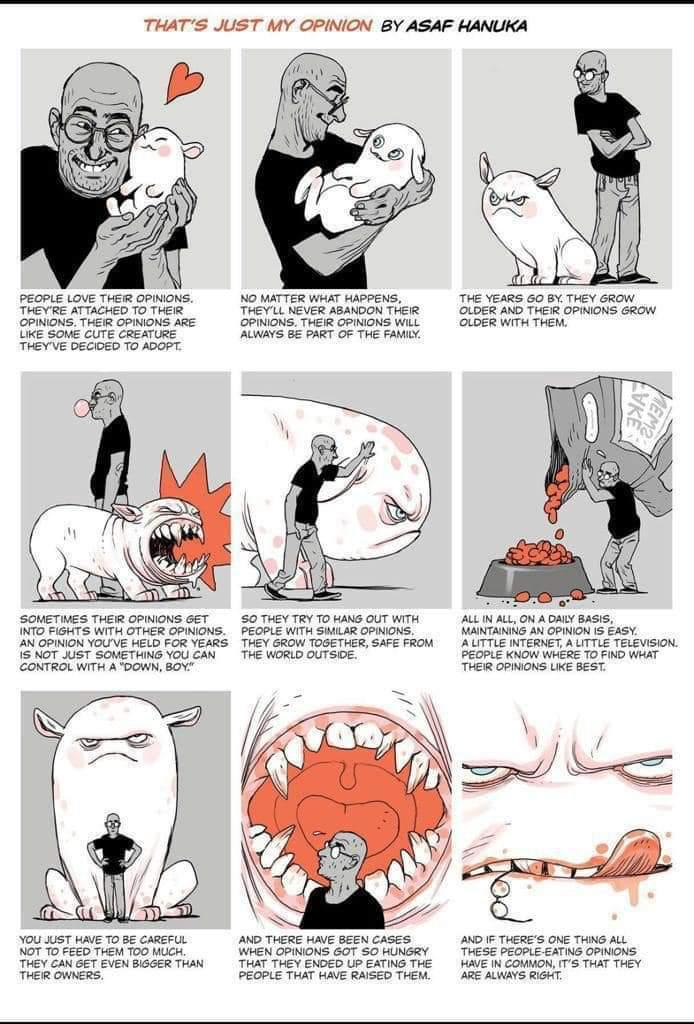Sunday Reads #97: They will never take our FREEDOM!
Jun 28, 2020 1:31 pm
Hope you and yours are keeping safe.
I'm back again with the most thought-provoking articles I've read in the week. (in case you missed my newsletter last week, you can find it here: Sunday Reads #96: 50 Powerful Ideas).
This week, we first take a look at psychological reactance. How we react when our freedoms are taken away, even if those freedoms are unimportant to us.
Next, a great interview of Marc Andreessen, touching on productivity, goals & systems, and learning.
And last, a comic on why you should hold your opinions with care.
Here's the deal - Dive as deep as you want. Read my thoughts first. If you find them intriguing, read the main article. If you want to learn more, check out the related articles and books.
[PS. I will be changing the newsletter to a new system (Substack) next week, as I'm having some deliverability issues with the current one. So do watch out for the email next week - it might not show up in your inbox properly the first time.]
1. They will never take... our FREEDOM!
![]()
(Mel Gibson in Braveheart, feeling a little blue).
Last Friday, the lockdown in Singapore was lifted. It was a glorious, sunny day. As I looked out of my window and saw a few people swimming in the pool (it had been closed through the lockdown), my first thought was, “I’ll go for a swim this evening. It will be amazing.”
My second thought was, “Wait, that doesn’t make sense!”
- I’m not a good swimmer.
- I hate swimming.
- In the two years I’ve lived in this condo, I’ve never used the pool. Not once.
So what the hell happened there?
What happened was, I got some freedom back, and I loved it. Even if I’ve never actually used that freedom, and therefore, its value to me is precisely zero.
The above was a benign example. But this yearning for freedom, even when we don’t actually need it, is an intense force driving our behavior.
The term for this is Psychological reactance. Here’s Wikipedia on the subject:
Reactance is an unpleasant motivational arousal (reaction) to offers, persons, rules, or regulations that threaten or eliminate specific behavioral freedoms. Reactance occurs when a person feels that someone or something is taking away their choices or limiting the range of alternatives.
As Dr. Robert Cialdini says in Influence: The Psychology of Persuasion, this is a powerful impulse.
As opportunities become less available, we lose freedoms. And we hate to lose freedoms we already have.
This desire to preserve our established prerogatives is the centerpiece of psychological reactance theory.
According to the theory, whenever free choice is limited or threatened, the need to retain our freedoms makes us desire them (as well as the goods and services associated with them) significantly more than previously. So when increasing scarcity—or anything else—interferes with our prior access to some item, we will react against the interference by wanting and trying to possess the item more than before.
That’s why we have these videos of people rejecting masks in different parts of the US.
In this one, a protester thunders, “I will not be muzzled like a mad dog!”.
And the video in this twitter post has a few strange quotes:
- “They want to throw God’s wonderful breathing system out the door.” Umm, no.
- “You, doctor, are going to be arrested for crimes against humanity!” (for saying that people should wear masks).
- “The mask is literally killing people”.
That’s why young parents experience the “terrible twos”.
Around the age of two, children come to a full recognition of themselves as individuals. This newfound sense of autonomy also brings along the concept of freedom. And the child wants to explore and test (again and again) the boundaries of this freedom.
Much to the chagrin and frustration of the parents.
There’s this hilarious example in Cialdini’s book, about banned detergents in Florida.
Dade County (containing Miami), Florida, imposed an antiphosphate ordinance prohibiting the use—and possession!—of laundry or cleaning products containing phosphates.
A study done to determine the social impact of the law discovered two parallel reactions on the part of Miami residents.
First, in what seems a Florida tradition, many Miamians turned to smuggling. Sometimes with neighbors and friends in large “soap caravans,” they drove to nearby counties to load up on phosphate detergents. Hoarding quickly developed; and in the rush of obsession that frequently characterizes hoarders, families were reported to boast of twenty-year supplies of phosphate cleaners.
The second reaction to the law was more subtle and more general than the deliberate defiance of the smugglers and hoarders. Spurred by the tendency to want what they could no longer have, the majority of Miami consumers came to see phosphate cleaners as better products than before.
That’s also why book censoring doesn’t work.
Or rather, it works too well. It’s every new writer’s dream for their first book to be banned.
Readers not only want the book even more than before, the book also gets a halo effect of “truths they don’t want us to hear”.
Have you noticed other examples of psychological reactance? Of how we overvalue unimportant freedoms we’re about to lose? Hit reply, and let me know!
[Note: you can also find the above article here on the blog, in case you'd like to share with friends.]
2. Marc Andreessen on Productivity, Goals & Systems, and Learning.
There's a new interview out, of Marc Andreessen. He reflects on what he's learned over the last decade of running Andreessen Horowitz.
The article is a long-ish read, but it's well worth your time.
Things that I found very interesting:
On managing your schedule.
Andreessen shared a snapshot of his calendar.

Notice a couple of things:
- Everything is scheduled. Even sleep.
- There's a ton of free time scheduled.
As Marc says,
Free time is critical because that's the release valve. You can work full tilt for a long time as long as you know you have actual time for yourself coming up. I find if you don't schedule enough free time, you get resentful of your own calendar.
The three things you tend to notice with executives [who are scheduled back to back with no free time]:
One, they just never have any time to actually think. And that turns out to be a fairly important thing.
Two, they have a hard time adjusting to changes in circumstances. In our business of venture capital, you get a lot of problems that come up. There is a lot of firefighting. It's like those classic movie scenes when there's a huge crisis and somebody calls out to their secretary “Cancel my schedule!”. Well, maybe you wouldn’t need to do that if you had some flexibility in your calendar.
Then the other thing you’ve probably seen is the managers who are regimented to that degree end up being micro managers.
On managing outputs vs. inputs.
In venture capital, feedback loops are very slow. You do a deal, and then you wait five years (sometimes longer) to see if it will work. The focus needs to be a lot more on process, than on outputs.
Yeah, we're basically all about inputs. It's basically process versus outcome... Venture capital is too elongated an activity. We don't really know whether something is going to work or not work in the first five years of its life after we passed. And so it’s - okay, what do I learn?
What we’ve zeroed in on is - what's the optimal way to run the process? What’s the optimal way to run the firm? What’s the optimal way to help the entrepreneur?By the way, the optimal way to help is not too much help. The optimal way is to make sure we understand what's happening in the industry, what's the best way to help with our network, the optimal way to help the management teams. It's all a process.
I've had a similar experience with my angel investing fund. Learning is a much slower process. It's been 4 years since we started investing, and it's only now that we're learning what worked and what did not.
On reading and learning.
The thing I've tried to do the last few years is really ‘barbell’ the inputs. I basically read things that are either up to this minute or things that are timeless.
The other book technique is from Chris Dixon. He thinks of chapters in books like blog posts. When he sits down to read, he goes and looks at the table of contents as a set of blog posts, Oh, those two look interesting already? And then you say - okay, I can throw the rest away. I'm not gonna read every post in the blog either, right? I'm only gonna read interesting ones.
3. And to end, some food for thought.
We don't own our opinions. Our opinions own us.
Unless we're careful. As Asaf Hanuka says in this excellent comic:

That's it for this week! Hope you liked the articles. Drop me a line (just hit reply) and let me know what you think.
Jitha